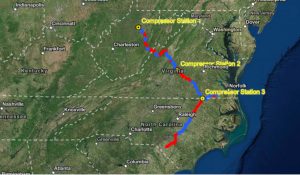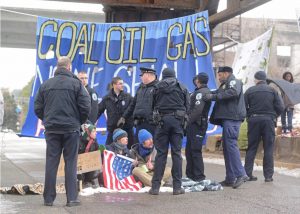At 7 a.m. on February 23, 2015, about 50 environmental activists marched through the streets of Richmond in an attempt to halt the construction of the Atlantic Coast Pipeline (ACP) through Virginia. Dominion Energy, the state’s reigning power company, had invested heavily in the ACP, arguing that the 600-mile pipeline would bring cleaner energy to the Commonwealth. The protesters countered that the pipeline would “sell our future,” threatening the environment and the health of Virginia’s residents. Protesters marched from the Capitol to Dominion’s headquarters at 2nd and Tredegar Streets, where some rappelled from bridges and others set up a human blockade. The police were called, and ten protesters were arrested.
Our country is traversed by a network of pipelines—over 2.6 million miles of them. Oil pipelines, such as the ACP and more famous North Dakota Access Pipeline, transport massive amounts of oil or natural gas across long distances. Pipelines can be either above ground on stanchions or several feet under the earth. The ACP, like most pipelines, is being buried underground. In order for pipeline construction to be approved, a lot of bridges must be crossed. The first is gaining approval from the Federal Energy Regulatory Commission (FERC), an independent sector in the U.S. Department of Energy, on the location, construction, and operation of interstate pipelines such as the ACP. The next step is to obtain approval from the Pipeline and Hazardous Materials Administration (PHMSA). The PHMSA is charged with determining that each pipeline will be sound investment that creates jobs and alerting the public of its construction and instructing them on what to do in case of an emergency. The ACP has started construction meaning it has passed all the necessary approvals.
Once fully constructed, the ACP will transport oil over 600 miles. The pipeline will start in West Virginia, travel through Virginia, and end in North Carolina. The following figure displays the construction plans for the next two years until it is completed. There were over 300 alterations to the path and there were 6,000 miles of proposed pipeline paths until they came across the current plan in order to protect sensitive environmental areas and comply with private landowners.
 The building of the pipeline has raised an intense political debate, polarizing Virginians with different visions and priorities. The entities vouching for its construction are Dominion Energy, Duke Energy, Piedmont Natural Gas, and Southern Gas Company. These companies all invested in the pipeline and will benefit from it; however, Dominion has the largest share and is thus in charge of construction and operation of the ACP. Thus, I will be focusing on Dominion and their case for why the ACP is beneficial to these three states. Opposing the gas and oil companies are a loose coalition of environmental activists, politicians, and environmental lawyers, and sympathetic citizens.
The building of the pipeline has raised an intense political debate, polarizing Virginians with different visions and priorities. The entities vouching for its construction are Dominion Energy, Duke Energy, Piedmont Natural Gas, and Southern Gas Company. These companies all invested in the pipeline and will benefit from it; however, Dominion has the largest share and is thus in charge of construction and operation of the ACP. Thus, I will be focusing on Dominion and their case for why the ACP is beneficial to these three states. Opposing the gas and oil companies are a loose coalition of environmental activists, politicians, and environmental lawyers, and sympathetic citizens.
Dominion, an energy distribution company, headquartered in downtown Richmond, is one of the largest producers and transporters of energy in the country. They declare their corporate mission to “serve our customers safely and reliably, strengthen our communities, minimize environmental impacts, reward our shareholders, live our values.” Dominion’s arguments for constructing the ACP focus on economic efficiency and savings. They contend that the ACP is necessary to keep up with rising demand for natural gas, the ACP will save Dominion customers a collective $377 million a year, and that the pipeline will generate 17,240 jobs during construction and will require 2,200 jobs to operate. They also provide claims that it will actually benefit the environment by providing cleaner energy by “assisting in the transition away from older, higher-emission power sources.” These are nice to see for shareholders, but the protesters on February 23, 2015 thought differently.
 Protesters took to direct action to bring the matter of the ACP to public eye and, by posting pictures and videos of their actions, using our current age of social media to their advantage .. With catchy chants such as “which side are you on” and “we are responsible,” the protesters gained attention and support from the Richmond chapter of the socialist Industrial Workers of the World (IWW), a group dedicated to promoting direct action from workers. They called their action a “People’s Climate March.”
Protesters took to direct action to bring the matter of the ACP to public eye and, by posting pictures and videos of their actions, using our current age of social media to their advantage .. With catchy chants such as “which side are you on” and “we are responsible,” the protesters gained attention and support from the Richmond chapter of the socialist Industrial Workers of the World (IWW), a group dedicated to promoting direct action from workers. They called their action a “People’s Climate March.” 
In their online presence, they sought to dismantle the claims of Dominion. They begin with the obvious: the amount of damage this pipeline will do to the environment — rivers, lakes, mountains, endangered plant and animal species and the harmful process of forest fracking –greatly outweigh Dominion’s claim that the pipeline will provide cleaner source of energy. This argument is also backed up by the fractracker alliance, an organization dedicated to assessing and communicating the risks caused by fracking and pipelines such as the ACP. Their next argument explains that unsustainable industries such as coal, oil, and natural gas put the surrounding communities in harm’s way due to unsafe working conditions. The affected areas are largely poorer, working class areas often with a large number of minorities and Native Americans.
Most of the ACP runs through the mountainous and poverty stricken West Virginia appalachia and the Blue Ridge mountains of Virginia. These regions are left with the only option of taking direct action against large, powerful corporations. The IWW’s most convincing argument states that even with the FERC’s “woefully inadequate” assessment of the ACP’s greenhouse gas emissions, the construction of the ACP will strengthen these area’s reliance on high emission fossil fuels, thus hindering the ability to make the much needed transition to renewable energies.
While protesters took to the streets to raise public awareness, a nonprofit organization named the Southern Environmental Law Center (SELC) worked behind the scenes to address the legality of what Dominion is doing with the ACP. The lawyers at the SELC argue that the pipeline is unnecessary, that Dominion is grossly overestimating how much our energy demand will increase, and that Dominion is only doing this to raise its bottom line and give investors a strong return Synapse Energy Economics did research for the SELC and came up with results for high and low expectancies of energy demand in the coming years. According to Synapse, Dominion claims that the demand for gas will be 140% that of their estimate.
If Dominion so grossly overestimated the need of their project, why is construction happening in the first place? The pipeline is being built because, in the United States, profits take precedence over scientific evidence and the values of a sustainable environment. This is not new phenomenon: Large corporations have, in other decades or centuries, stripped the land and polluted rivers, lakes, and larger ecosystems. But, in our moment, the balance of power seems to be typing against environmentalism.
We currently have a president who is an active climate change denier, and a head of the Environmental Protection Agency, Scott Pruitt, a Trump appointed, who also vehemently denies the reality of climate change. When the facts are laid out so clearly by scientists that an elementary school kid could understand, how are political leaders of our country ignorant to proof? The simple answer is money. In a capitalist society such as ours, the people in power are the ones with money. Big oil barons have loads of political influence due to their success in making our country reliant on natural gas for our energy. What the ACP is doing is making these impoverished, mountainous areas of the country reliant on high emission, and dangerous-both for workers and the environment — sources of energy. As said by the IWW, these inflicted areas are so impoverished that they have no option other than to take direct actions against these corporations putting them in harm’s way. If it weren’t for protest culture and public displays such as the Richmond People’s Climate March, oppressed minorities would be hopeless.
Further Reading
Sheppard, Nora. Introduction to the Oil Pipeline Industry. Austin, TX, 1984.
Speight, James G. An Introduction to Petroleum Technology, Economics, and Politics. Wiley-Scrivener, 2011.
